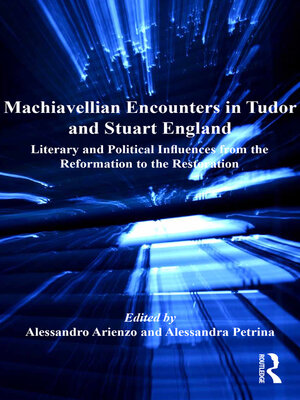Machiavellian Encounters in Tudor and Stuart England
ebook ∣ Literary and Political Influences from the Reformation to the Restoration · Anglo-Italian Renaissance Studies
By Alessandro Arienzo

Sign up to save your library
With an OverDrive account, you can save your favorite libraries for at-a-glance information about availability. Find out more about OverDrive accounts.
Find this title in Libby, the library reading app by OverDrive.



Search for a digital library with this title
Title found at these libraries:
| Library Name | Distance |
|---|---|
| Loading... |
Taking into consideration the political and literary issues hanging upon the circulation of Machiavelli's works in England, this volume highlights how topics and ideas stemming from Machiavelli's books - including but not limited to the Prince - strongly influenced the contemporary political debate. The first section discusses early reactions to Machiavelli's works, focusing on authors such as Reginald Pole and William Thomas, depicting their complex interaction with Machiavelli. In section two, different features of Machiavelli's reading in Tudor literary and political culture are discussed, moving well beyond the traditional image of the tyrant or of the evil Machiavel. Machiavelli's historiography and republicanism and their influences on Tudor culture are discussed with reference to topical authors such as Walter Raleigh, Alberico Gentili, Philip Sidney; his role in contemporary dramatic writing, especially as concerns Christopher Marlowe and William Shakespeare, is taken into consideration. The last section explores Machiavelli's influence on English political culture in the seventeenth century, focusing on reason of state and political prudence, and discussing writers such as Henry Parker, Marchamont Nedham, James Harrington, Thomas Hobbes and Anthony Ascham. Overall, contributors put Machiavelli's image in sixteenth- and seventeenth-century England into perspective, analyzing his role within courtly and prudential politics, and the importance of his ideological proposal in the tradition of republicanism and parliamentarianism.







